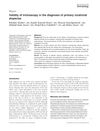TLDR Early treatment of EPDS can improve outcomes and reduce recurrence risk.
Erosive pustular dermatosis of the scalp (EPDS) is a rare chronic inflammatory disorder that typically affects elderly people, leading to pustular lesions, erosions, and crusts on the scalp, and in advanced stages, scarring alopecia. The cause of EPDS is not fully understood, but skin trauma and autoimmune mechanisms are known predisposing factors. Associated diseases include autoimmune disorders such as rheumatoid arthritis and Hashimoto thyroiditis. Diagnosis is based on a combination of predisposing factors, clinical manifestations, non-specific histology, and negative laboratory investigations for other diseases. Treatments include topical high-potency corticosteroids, retinoids, and photodynamic therapy, although relapses after discontinuation of treatment are common. The study suggests that early treatment can lead to a greater response with minimal risk of recurrence, and long-term follow-up is advisable to monitor for possible relapses or the development of cutaneous malignancy.
 7 citations
,
June 2019 in “Australasian Journal of Dermatology”
7 citations
,
June 2019 in “Australasian Journal of Dermatology” Elderly men with a scalp condition healed in about 26 days using specific creams and dressings, with no return of the condition in 6 months.
 8 citations
,
April 2019 in “Australasian Journal of Dermatology”
8 citations
,
April 2019 in “Australasian Journal of Dermatology” The article suggests a treatment plan for a stubborn scalp condition common in elderly Australians to help improve their lives.
8 citations
,
January 2019 in “JAAD Case Reports” EPDS can cause recurring scalp sores and hair loss if not treated.
 25 citations
,
October 2018 in “Journal of The American Academy of Dermatology”
25 citations
,
October 2018 in “Journal of The American Academy of Dermatology” Erosive pustular dermatosis of the scalp is a type of skin inflammation often confused with other conditions, requiring continuous treatment.
10 citations
,
November 2017 in “Skin Appendage Disorders” Erosive pustular dermatosis in elderly people may be linked to aging immune systems and skin damage.
 53 citations
,
February 2017 in “Journal of The American Academy of Dermatology”
53 citations
,
February 2017 in “Journal of The American Academy of Dermatology” The conclusion is that high-potency steroids or tacrolimus are effective treatments for erosive pustular dermatosis of the scalp.
 34 citations
,
April 2016 in “International Journal of Dermatology”
34 citations
,
April 2016 in “International Journal of Dermatology” Trichoscopy is a useful method for identifying primary cicatricial alopecias and their specific types.
 21 citations
,
January 2015 in “Dermatologic Therapy”
21 citations
,
January 2015 in “Dermatologic Therapy” Latanoprost may cause scalp inflammation and delayed healing.
34 citations
,
July 2013 in “Clinical Cosmetic and Investigational Dermatology” Erosive pustular dermatosis is a rare skin disease that's hard to treat and affects the scalp or legs.
49 citations
,
January 2005 in “Dermatology” Systemic retinoids may effectively treat erosive pustular dermatosis of the scalp.
 4 citations
,
September 2021 in “Dermatopathology”
4 citations
,
September 2021 in “Dermatopathology” The conclusion is that Erosive Pustular Dermatosis of the Scalp is a rare condition best treated with strong topical steroids and sometimes systemic treatment.
 3 citations
,
July 2018 in “Elsevier eBooks”
3 citations
,
July 2018 in “Elsevier eBooks” Erosive pustular dermatosis of the scalp is a rare condition that causes scarring hair loss, mainly in older women, and requires ongoing treatment.
 21 citations
,
January 2015 in “Dermatologic Therapy”
21 citations
,
January 2015 in “Dermatologic Therapy” Latanoprost may cause scalp inflammation and delayed healing.
 February 2025 in “Cureus”
February 2025 in “Cureus” Hair transplants can rarely cause scalp inflammation leading to hair loss, needing early detection and treatment.
 18 citations
,
January 2020 in “Journal of the European Academy of Dermatology and Venereology”
18 citations
,
January 2020 in “Journal of the European Academy of Dermatology and Venereology” High-potency steroids or tacrolimus are effective treatments for Erosive Pustular Dermatosis of the Scalp.










